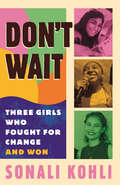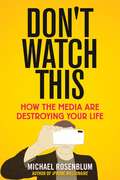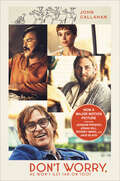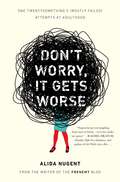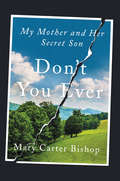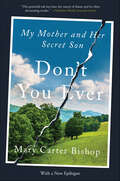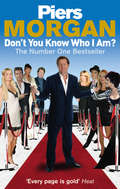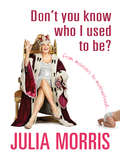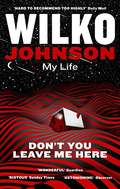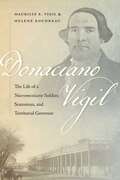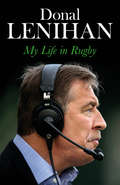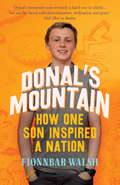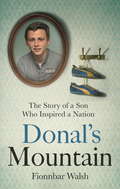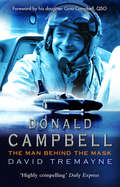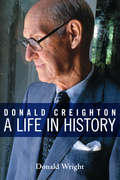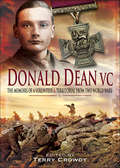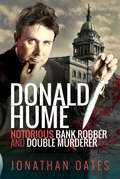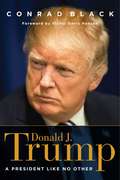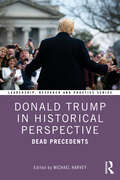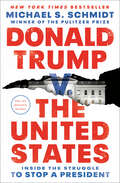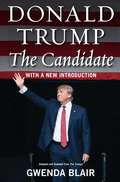- Table View
- List View
Don't Wait: Three Girls Who Fought for Change and Won
by Sonali KohliFollows the stories of three young women activists of color fighting for some of today&’s most pressing movements of defunding the police, environmental justice, and arts educationGirls of color have always been on the front lines of the fight for equal rights—to vote, to learn, to live—even when they are the last to benefit from the outcomes of their work. In Don&’t Wait, journalist Sonali Kohli follows three teenagers&’ efforts to make their communities safer, healthier places.Don&’t Wait highlights what propelled the teenagers into their activism to their experiences organizing and incorporates Q&As with important lessons from activists who have led the way.The three teen activists include:· Nalleli has lived across the street from an active oil well in South Los Angeles and at age 7, developed serious health problems. Nalleli and her mother take on an oil company and become environmental justice activists.· Kahlila, following the murder of George Floyd and looking to help fight back, becomes involved with the Black Lives Matter movement in Los Angeles and fights to defund school police in one of the largest school police forces in the nation.· Sonia, an accomplished singer grappling with finding an creative outlet in the pandemic, strives to increase access to arts education in schools across California.As the young women transition from teen to adult activists, Don&’t Wait reflects on the powerful lessons they&’ve learned in their activism while building movements in their communities that will continue to live on as they move forward.
Don't Watch This: How the Media Are Destroying Your Life
by Michael RosenblumAn unfiltered look at the addictive properties of social media, TV, and movies on our culture, with strategies to help you reclaim control over your life. Today, the average person spends an astonishing eight hours a day watching TV or videos online. Watching social media stories, movies, and TV is now our number one activity, outpacing everything else that we do, including sleep. This habit has an incredibly powerful influence on our lives – from what we think to what we buy to whom we elect. Media are more than entertainment; they are a drug. This media addiction wreaks havoc on our mental health, causing increased stress, depression, and anxiety, and ruining personal relationships. It also drives us deeper and deeper into debt. In Don&’t Watch This, former TV producer and Ivy League professor Michael Rosenblum reveals the hidden psychology driving us to media addiction. He describes why solving the problem is not as simple as swearing off our devices, but about learning how to use media for good. Rosenblum reveals the key to getting the best out of technology, without letting it get the best of you. Inside, you&’ll learn: How to take control of the mediaHow to use your phone&’s camera to spread stories worth tellingHow having a former reality TV star in the Oval Office has changed the scope of mediaWhy posting selfies on Instagram isn&’t going to change the world, and what you can post instead Enlightening and empowering, Don&’t Watch This provides actionable, revolutionary techniques and insight to control your media addiction—helping you live the life you really want.
Don't Worry, He Won't Get Far on Foot
by John F. CallahanNow a major motion picture directed by Gus Van Sant and starring Joaquin Phoenix, Jonah Hill, and Rooney MaraFeaturing more than 60 of Callahan's original cartoons“When people laugh like hell and then say, ‘That’s not funny,’ you can be pretty sure they’re talking about John Callahan.”— P.J. O’RourkeIn 1972, at the age of 21, John Callahan was involved in a car crash that severed his spine and made him a quadriplegic. A heavy drinker since the age of 12 (alcohol had played a role in his crash), the accident could have been the beginning of a downward spiral. Instead, it sparked a personal transformation. After extensive physical therapy, he was eventually able to grasp a pen in his right hand and make rudimentary drawings. By 1978, Callahan had sworn off drinking for good, and begun to draw cartoons.Over the next three decades, until his death in 2010, Callahan would become one of the nation’s most beloved—and at times polarizing—cartoonists. His work, which shows off a wacky and sometimes warped sense of humor, pokes fun at social conventions and pushes boundaries. One cartoon features Christ at the cross with a thought bubble reading “T.G.I.F.” In another, three sheriffs on horseback approach an empty wheelchair in the desert. “Don’t worry,” one sheriff says to another, “He won’t get far on foot.”Don’t Worry, He Won’t Get Far on Foot recounts Callahan’s life story, from the harrowing to the hilarious. Featuring more than 60 of Callahan’s cartoons, it’s a compelling look at art, addiction, disability, and fame. A film adaptation scheduled for 2018, starring Joaquin Phoenix as John Callahan, will bring fresh attention to this underappreciated classic.
Don't Worry, He Won't Get Far on Foot: The Autobiography of a Dangerous Man
by John CallahanJohn Callahan in this moving biography tells in frank detail about his childhood, his alcoholism, his accident that left him a quadriplegic and his growth as a cartoonist. Funny and humorous, tragic and frightening this is a frank and serious look at the life of a "Dangerous man"
Don't Worry, it Gets Worse: One Twentysomething's (Mostly Failed) Attempts at Adulthood
by Alida NugentAlida Nugent graduated college with a degree in one hand and a drink in the other, eager to trade in parties and all-nighters for "the real world. ” But post-grad wasn’t the glam life she imagined. Soon buried under a pile of bills, laundry, and three-dollar bottles of wine, it quickly became clear that she had no idea what she was doing. But hey, what twentysomething does? In Don’t Worry, It Gets Worse, Nugent shares what it takes to make the awkward leap from undergrad to "mature and responsible adult that definitely never eats peanut butter straight from the jar and considers it a meal. ” From trying to find an apartment on the black hole otherwise known as Craigslist to the creative maneuvering needed to pay off student loans and still enjoy happy hour, Nugent documents the formative moments of being a twentysomething with a little bit of snark and a lot of heart. Perfect for fans of HBO's Girls and Allie Brosh's Hyperbole and a Half, and based on her popular Tumblr blog The Frenemy, Don’t Worry, It Gets Worse is a love note to boozin’, bitchin’ ladies everywhere. .
Don't You Ever: My Mother and Her Secret Son
by Mary Carter Bishop“In this profound memoir, Mary Carter Bishop takes an openhearted and unflinching look at a family history that is equal parts love story and requiem for a brother she barely knew. Bishop turns her formidable investigative journalism skills inward to unearth long-simmering class and culture divides in bucolic rural Virginia."--Beth Macy From a prizewinning journalist, Mary Carter Bishop, a moving and beautifully rendered memoir about the half-brother she didn’t know existed that hauntingly explores family, class, secrets, and fate.Applying for a passport as an adult, Mary Carter Bishop made a shocking discovery. She had a secret half-brother. Her mother, a farm manager’s wife on a country estate, told Mary Carter the abandoned boy was a youthful "mistake" from an encounter with a married man. There’d been a home for unwed mothers; foster parents; an orphanage.Nine years later, Mary Carter tracked Ronnie down at the barbershop where he worked, and found a near-broken man—someone kind, and happy to meet her, but someone also deeply and irreversibly damaged by a life of neglect and abuse at the hands of an uncaring system. He was also disfigured because of a rare medical condition that would eventually kill him, three years after their reunion. During that window, Mary Carter grew close to Ronnie, and as she learned more about him she became consumed by his story. How had Ronnie’s life gone so wrong when hers had gone so well? How could she reconcile the doting, generous mother she knew with a woman who could not bring herself to acknowledge her own son?Digging deep into her family’s lives for understanding, Mary Carter unfolds a sweeping story of religious intolerance, poverty, fear, ambition, class, and social expectations. Don’t You Ever is a modern Dickensian tale about a child seemingly cursed from birth; a woman shattered by guilt; a husband plagued by self-doubt; a prodigal daughter whose innocence was cruelly snatched away—all living in genteel central Virginia, a world defined by extremes of rural poverty and fabulous wealth.A riveting memoir about a family haunted by a shameful secret, Don’t You Ever is a powerful story of a woman’s search for her long-hidden sibling, and the factors that profoundly impact our individual destinies.
Don't You Ever: My Mother and Her Secret Son
by Mary Carter Bishop“In this profound memoir, Mary Carter Bishop takes an openhearted and unflinching look at a family history that is equal parts love story and requiem for a brother she barely knew. Bishop turns her formidable investigative journalism skills inward to unearth long-simmering class and culture divides in bucolic rural Virginia."--Beth Macy From a prizewinning journalist, Mary Carter Bishop, a moving and beautifully rendered memoir about the half-brother she didn’t know existed that hauntingly explores family, class, secrets, and fate.Applying for a passport as an adult, Mary Carter Bishop made a shocking discovery. She had a secret half-brother. Her mother, a farm manager’s wife on a country estate, told Mary Carter the abandoned boy was a youthful "mistake" from an encounter with a married man. There’d been a home for unwed mothers; foster parents; an orphanage.Nine years later, Mary Carter tracked Ronnie down at the barbershop where he worked, and found a near-broken man—someone kind, and happy to meet her, but someone also deeply and irreversibly damaged by a life of neglect and abuse at the hands of an uncaring system. He was also disfigured because of a rare medical condition that would eventually kill him, three years after their reunion. During that window, Mary Carter grew close to Ronnie, and as she learned more about him she became consumed by his story. How had Ronnie’s life gone so wrong when hers had gone so well? How could she reconcile the doting, generous mother she knew with a woman who could not bring herself to acknowledge her own son?Digging deep into her family’s lives for understanding, Mary Carter unfolds a sweeping story of religious intolerance, poverty, fear, ambition, class, and social expectations. Don’t You Ever is a modern Dickensian tale about a child seemingly cursed from birth; a woman shattered by guilt; a husband plagued by self-doubt; a prodigal daughter whose innocence was cruelly snatched away—all living in genteel central Virginia, a world defined by extremes of rural poverty and fabulous wealth.A riveting memoir about a family haunted by a shameful secret, Don’t You Ever is a powerful story of a woman’s search for her long-hidden sibling, and the factors that profoundly impact our individual destinies.
Don't You Know Who I Am?: Insider Diaries of Fame, Power and Naked Ambition
by Piers Morgan'They say you can always remember where you where when pivotal moments happen, such as losing your virginity or Elvis dying. Let me add another to the list: the moment I sang a duet to the the "Macarena" with Timmy Mallett, live to millions of people...'Sacked from his high-profile job as a national newspaper editor, Piers Morgan dived helplessly into the world of celebrity. But even twenty years of commenting on the lives of the rich and famous couldn't prepare him for the extraordinary world he uncovered...A riveting, scandelous and brutally honest account of one man's quest for celebrity, Don't You Know Who I Am? lifts the lid on the egos and outrageous behaviour of everyone from Paris Hilton to Cherie Blair, Kate Moss to the legend that is the Hoff.
Don't You Know Who I Used to Be?: From Manolos to Motherhood
by Julia MorrisJulia Morris is the first to admit she does not know much, but these are some of the things she knows for sure: - Writing a Logie speech when you are aged eight is not normal; - Cathy Freeman is the only woman in the world who looks good in white lycra; - $22,000 Aussie dollars converts to about 23 pounds Sterling; - 'Overnight romance' sounds better than 'one-night stand'; - Tom Jones is not the only dark-haired Welsh man with sex appeal; - A blue cross on a white stick WILL change your life. DON'T YOU KNOW WHO I USED TO BE? is a delightful memoir from one of Australia's best-loved comedians about moving to the UK, frocking up, dating, getting married, giving birth to her first child and coming home...and not always wearing Manolos.
Don't You Leave Me Here: My Life
by Wilko Johnson'Man, there's nothing like being told you're dying to make you feel alive.' In 2013, Dr Feelgood founder, Blockheads member and musical legend Wilko Johnson was diagnosed with terminal cancer. With ten months to live, he decided to accept his imminent death and went on the road. His calm, philosophical response made him even more beloved and admired. And then the strangest thing happened: he didn't die. Don't You Leave Me Here is the story of his life in music, his life with cancer, and his life now - in the future he never thought he would see.
Don't You Leave Me Here: My Life
by Wilko Johnson'Man, there's nothing like being told you're dying to make you feel alive.' Wilko JohnsonIn 2013, Dr Feelgood founder, Blockheads member and musical legend Wilko Johnson was diagnosed with terminal cancer. With ten months to live, he decided to accept his imminent death and went on the road. His calm, philosophical response made him even more beloved and admired. And then the strangest thing happened: he didn't die. Don't You Leave Me Here is the story of his life in music, his life with cancer, and his life now - in the future he never thought he would see.
Donaciano Vigil: The Life of a Nuevomexicano Soldier, Statesman, and Territorial Governor
by Helene Boudreau Maurilio E. VigilBorn in Santa Fe in 1802, Donaciano Vigil was an active participant in many of the critical events in New Mexico&’s history in the nineteenth century. Vigil was witness to New Mexico&’s transition from a Spanish province (1802–1821) to a Mexican department (1821–1846) and eventually to an American territory (1846–1877), and he was a key player in most of the events of that era. As a Hispano soldier and officer in the New Mexico Militia, he was instrumental in the Navajo Wars, the Rio Arriba insurrection of 1837, the Texas invasion of 1841, and the American invasion of 1846. As a Mexican statesman in New Mexico, he was one of the most active assemblymen. Following the American occupation, he joined the civil government, first as secretary, then as governor. It was in these roles that Donaciano left an enduring impact and legacy on the territory.In this gripping biography of a remarkable man, Maurilio E. Vigil and Helene Boudreau fill the gap within the scholarship on Hispanics in nineteenth-century New Mexico.
Donal Lenihan: My Life in Rugby
by Donal LenihanAs player, manager, and pundit, Donal Lenihan has seen it all in the world of rugby - and done much of it too. A victorious captain of Munster Junior and Senior Schools, he went on to skipper the Ireland team at the inaugural Rugby World Cup in New Zealand in 1987 and was a fixture in the second row for over a decade, winning two Triple Crowns and three Five Nations championships. Selected for three British & Irish Lions tours, he was famous for skippering the unbeaten side nicknamed 'Donal's Doughnuts', before taking charge of both Ireland and the Lions as manager. From such a stellar position at the heart of the rugby world, Donal Lenihan has a wealth of stories to tell from both on and off the pitch, from raucous antics on tour to the sometimes difficult fellowship of players in a time of Troubles. He delves deeply into Cork and Munster culture and the influence on his career of his family. And as a much-respected analyst, Donal is also not short on voicing his opinion on the rights and wrongs of the modern game, and how the transition from the amateur to the professional era has affected the heart and soul of rugby.Full of wit, insight and emotional sincerity, this is a rugby book for the ages by a sporting great.
Donal's Mountain: How One Son Inspired a Nation
by Fionnbar Walsh'Donal Walsh was able to see the beauty in life. He spent his valuable time helping us to open our eyes' Cecelia Ahern, authorDonal Walsh lost his battle against cancer in May 2013, but he left behind an extraordinary legacy. In his short life, he had fought the disease on three occasions with bravery and determination, but he had also come to national attention when he spoke out about suicide in young people in an RTE television interview and, later, in an article in a national newspaper. Donal was determined to open people's eyes to the beauty of life and to help them to see that death is never an answer.His words provoked a national reaction and had real and lasting results - in his death, Donal made us question ourselves and the way we live our lives. Before he died, he asked that his parents continue to spread the message of living life. Here, in this heartbreaking and inspirational memoir, his father Fionnbar gives voice to Donal in a testament to an exceptional young man and to a lasting legacy.
Donal's Mountain: The Story of the Son Who Inspired a Nation
by Fionnbar WalshDonal Walsh first came to international attention in Ireland aged sixteen, when a letter he wrote speaking out against the suicide epidemic in young people was published in the Irish Sunday Independent. At the time Donal was dying of cancer having battled it since the age of twelve through invasive and painful chemo treatments and operations. Donal had no choice about dying - and he wanted others to see that death is not an answer. With only a few weeks to live, Donal went on television and again spoke about the importance of living and of finding help in times of trouble. A few short weeks later, on May 12th 2013, Donal lost his battle with cancer and passed away. In this sometimes heart-breaking but ultimately inspirational book we see the boy behind the illness and hear the story of how one young boy from County Kerry who, in dying, shows us how to live life. From the close bonds he had with his parents, his sister and young friends, to the unique and inspirational outlook he had on life we hear of how he came to terms with his illness and how he spent his last weeks making as much of a difference to other people's lives as he could. All Donal asked before he died was that his parents continue his legacy and the message of the importance of living life. This book is his legacy.
Donal's Mountain: The Story of the Son Who Inspired a Nation
by Fionnbar WalshDonal Walsh first came to international attention in Ireland aged sixteen, when a letter he wrote speaking out against the suicide epidemic in young people was published in the Irish Sunday Independent. At the time Donal was dying of cancer having battled it since the age of twelve through invasive and painful chemo treatments and operations. Donal had no choice about dying - and he wanted others to see that death is not an answer. With only a few weeks to live, Donal went on television and again spoke about the importance of living and of finding help in times of trouble.A few short weeks later, on May 12th 2013, Donal lost his battle with cancer and passed away.In this sometimes heart-breaking but ultimately inspirational book we see the boy behind the illness and hear the story of how one young boy from County Kerry who, in dying, shows us how to live life.From the close bonds he had with his parents, his sister and young friends, to the unique and inspirational outlook he had on life we hear of how he came to terms with his illness and how he spent his last weeks making as much of a difference to other people's lives as he could.All Donal asked before he died was that his parents continue his legacy and the message of the importance of living life. This book is his legacy.
Donald Campbell: The Man Behind The Mask
by David TremayneGenerations are familiar with the haunting black and white television footage of Donald Campbell somersaulting to his death in his famous Bluebird boat on Coniston Water in January, 1967. It has become an iconic image of the decade. His towering achievements, and the drama of his passing, are thus part of the national psyche. But what of the man himself? The son of the legendary Sir Malcolm Campbell who was famous for being the ultimate record-breaker of the inter-war years - he broke the land speed record nine times and the water speed record four times with his Bluebird cars and boats - Donald Campbell was born to speed. He was outgoing and flamboyant, yet carefully orchestrated the image he presented to the world. Some saw him as a playboy adventurer; others, such as the radio producer on the twenty-first anniversary of his death, as a reckless daredevil with a death wish. He was known to take solace in extra-marital dalliances, and was obsessed with spiritualism. And in his final years, battered by a 360-mph accident while attempting the land record on the Bonneville Salt Flats in Utah, and his prolonged and anti-climactic subsequent effort on the treacherous Lake Eyre in Australia, Campbell appeared a haggard and often frightened man. He had become trapped on his record-breaker's treadmill as he continually sought to prove himself to his illustrious father, in whose long shadow he felt forever trapped. DONALD CAMPBELL: THE MAN BEHIND THE MASK paints a fascinating portrait of an intense, complex, superstitious yet abnormally brave man who was driven not only by the desire to prove that he was worthy of the mantle of his father, but also by his fervent and unswerving desire to keep Britain at the forefront of international speed endeavour. This book generates a unique insight into how his desperate fear of failure finally lured him into taking one risk too many.
Donald Creighton
by Donald WrightA member of the same intellectual generation as Harold Innis, Northrop Frye, and George Grant, Donald Creighton (1902-1979) was English Canada's first great historian. The author of eleven books, including The Commercial Empire of the St. Lawrence and a two-volume biography of John A. Macdonald, Creighton wrote history as if it "had happened," he said, "the day before yesterday." And as a public intellectual, he advised the prime minister of Canada, the premier of Ontario, and - at least on one occasion - the British government.Yet he was, as Donald Wright shows, also profoundly out of step with his times. As the nation was re-imagined along bilingual and later multicultural lines in the 1960s and 1970s, Creighton defended a British definition of Canada at the same time as he began to fear that he would be remembered only "as a pessimist, a bigot, and a violent Tory partisan."Through his virtuoso research into Creighton's own voluminous papers, Wright paints a sensitive portrait of a brilliant but difficult man. Ultimately, Donald Creighton captures the twentieth-century transformation of English Canada through the life and times of one of its leading intellectuals.
Donald Dean VC: The Memoirs of a Volunteer & Territorial from Two World Wars
by Terry Crowdy Susan BavinDonald Dean lied about his age to enlist in the Queen's Own Royal West Kent Regiment and serve on the Western Front, where he worked his way up from Private to acting Captain. It was in the last weeks of the war, late in September 1918, that he won his VC for leading a platoon in the determined defense of a recently captured and isolated trench against repeated German counterattacks. In one of these attacks, the Germans actually broke into the trench, forcing Dean to break off a radio call for artillery support with the words 'The Germans are here, goodbye!' Refusing to be overrun, he personally killed four of the Germans before they were finally evicted. Dean also served in World War II, witnessing the fall of France in 1940 and claiming to be the last Brit to get out of Boulogne. His frank account of the evacuation challenges some cherished conceptions and is very critical of the conduct of the Irish Guards in particular. He went on to fight in Madagascar, Sicilya and the Italian mainland. Donald Dean died in 1985.Military historian Terry Crowdy has edited Dean's letters and diaries, never previously published, adding additional notes and material from official reports to give the reader context. The result is a moving, often amusing and inspiring portrait of a little-known hero of two world wars.
Donald Hume: Notorious Bank Robber and Double Murderer
by Jonathan OatesFrom the bestselling author of John Christie of Rillington Place. &“If you have an interest in post war crime and criminals this is one for you!&” —Robert Bartlett, author of Blood Royal The trial of the year in 1950 was of Donald Hume, a North London petty thief accused of stabbing car dealer Stanley Setty to death, of cutting up his corpse and dropping his body parts from an airplane. The press and public were horrified and fascinated by the details. But Hume was convicted and jailed as an accessory—he later claimed his wife was guilty of the crime. He then fled to Switzerland, taking up with a Swiss woman in Zurich, but he needed money to finance his lavish lifestyle and he returned to robbery. He carried out two armed robberies, shooting a member of the bank staff, but getting clean away. Then in 1959 his attempt to rob a bank failed and he shot dead a bystander. Arrested, he stood trial and was sentenced to life, but was later deemed criminally insane and was returned to Britain and to Broadmoor. Jonathan Oates&’s compelling account of Hume&’s notorious life of crime is based on extensive primary research. It sheds new light on Hume and his crimes, especially the murder of Setty, and gives the reader a rare insight into the criminal underworld of the time.
Donald J. Trump: A President Like No Other
by Conrad BlackConrad Black, bestselling author of Franklin Delano Roosevelt: Champion of Freedom and Richard M. Nixon: A Life in Full, turns his attention to his "friend" President Donald J. Trump and provides the most intriguing and significant analysis yet of Trump's political rise. Ambitious in intellectual scope, contrarian in many of its opinions, and admirably concise, this is surely set to be one of the most provocative political books you are likely to read this year.
Donald Trump in Historical Perspective: Dead Precedents (Leadership: Research and Practice)
by Michael HarveyDonald Trump in Historical Perspective: Dead Precedents is a collection of chapters that utilizes the thinking of historians, philosophers, and political scientists to explore historical parallels to the presidency of Donald J. Trump, the 45th President of the United States of America. This collection provides an extensive analysis on the ways Trump’s impulsiveness, breaking of norms, and disregard for longstanding democratic pieties, caused him to represent a definitive end to the "American century," an era when American self-confidence, steadiness, and leadership, even in the face of titanic challenges, were almost universally taken for granted. Yet this book also argues how in the longer sweep of history, Trump is a familiar figure in the turbulent life of democracies. These in-depth chapters reveal the ways Trump represents the anti-institutionalist, the populist demagogue, the would-be authoritarian who exploits electoral and political vulnerabilities to gain and hold power. Through these detailed evaluations, these chapters suggest that Trump is not radically unique, but that democracies have produced many previous versions of the Trump phenomenon. This book is essential reading for scholars and students in political science, political theory, history, and leadership. This book is also noteworthy for readers interested in key developments in contemporary American democracy. One of its greatest appeals is its extensive look into leadership on an international scale, from Donald Trump’s global significance to various explorations of non-American leaders, and the comparisons that can be made.
Donald Trump v. The United States: Inside the Struggle to Stop a President
by Michael S. SchmidtWith unparalleled reporting, a Pulitzer Prize–winning New York Times reporter continues to break news about the most important political story of our lives as he chronicles the clash between a president and the officials of his own government who tried to stop him. <p><p> In the early days of the Trump presidency, the people who work in the institutions that make America America saw Trump up close in the Oval Office and became convinced that they had to stand up to an unbound president. These officials faced a situation without parallel in American history: What do you do, and who do you call, if you are the only one standing between the president, his extraordinary powers, and the abyss? <p> Michael S. Schmidt’s Donald Trump v. The United States tells the dramatic, high-stakes story of those who felt compelled to confront and try to contain the most powerful man in the world as he shredded norms and sought to expand his power. <p> Schmidt has broken many of the major stories of the Trump era, from the news of Hillary Clinton’s use of a personal email account to the report on former FBI director James Comey’s contemporaneous memos of conversations with Trump that led directly to the appointment of special counsel Robert S. Mueller III. Now he takes us inside the defining events of the presidency, chronicles them up close, and records the clash between an increasingly emboldened president and those around him, who find themselves trying to thwart the president they had pledged to serve, unsure whether he is acting in the interest of the country, his ego, his family business, or Russia. Through their eyes and ears, we observe an epic struggle. <p> Drawing on secret FBI and White House documents and confidential sources inside federal law enforcement and the West Wing, Donald Trump v. The United States is vital journalism, recording the shocking reality of a presidency like no other, a riveting contemporary history, and a lasting account of just how fragile and vulnerable the institutions of American democracy really are. <p> <b>A New York Times Bestseller</b>
Donald Trump: The Candidate
by Gwenda BlairOn the hugely successful hit reality TV show The Apprentice, Donald Trump tells his contenders that location and pricing are supremely significant. But in his own life, there have been other maxims: Do whatever it takes to win. Don't spare the chutzpah. Always use the superlative. Make everything into an advertisement for yourself. Whatever happens, always claim victory. Following these personal commandments, he has turned bragging, self-inflation, and showing off into competitive advantages that have brought him national and international renown. In Donald Trump: Master Apprentice, best-selling author Gwenda Blair recounts a true-life history with more twists and turns than any television producer could possibly imagine. Towering skyscrapers and glittering casinos, a luxury airline and a football-field-size yacht, steamy affairs and bitter lawsuits, near bankruptcy and stormy feuds -- all this and more are part of the life of Trump. An adaptation and update of her definitive biography, The Trumps, this new book provides fresh material on Donald Trump's brushes with bankruptcy, mammoth construction projects, and ever-expanding place in American life. Drawing on recent interviews with the celebrated real estate magnate, his associates, his rivals, and contestants from his television show, Blair offers new insight into the man who seems to have it all. For the first time, we also get a glimpse of the person who will ultimately decide the fate of the Trump brand: Donald Trump, Jr. , the real-life apprentice who hopes to put his own imprint on his father's empire.
